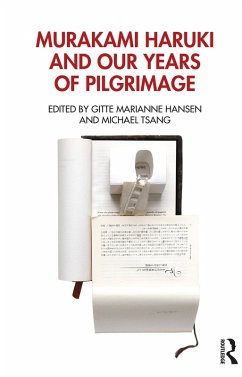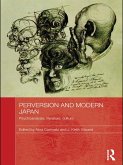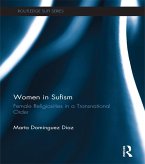Murakami Haruki and Our Years of Pilgrimage (eBook, ePUB)
Redaktion: Hansen, Gitte Marianne; Tsang, Michael
34,95 €
34,95 €
inkl. MwSt.
Sofort per Download lieferbar

17 °P sammeln
34,95 €
Als Download kaufen

34,95 €
inkl. MwSt.
Sofort per Download lieferbar

17 °P sammeln
Jetzt verschenken
Alle Infos zum eBook verschenken
34,95 €
inkl. MwSt.
Sofort per Download lieferbar
Alle Infos zum eBook verschenken

17 °P sammeln
Murakami Haruki and Our Years of Pilgrimage (eBook, ePUB)
Redaktion: Hansen, Gitte Marianne; Tsang, Michael
- Format: ePub
- Merkliste
- Auf die Merkliste
- Bewerten Bewerten
- Teilen
- Produkt teilen
- Produkterinnerung
- Produkterinnerung

Bitte loggen Sie sich zunächst in Ihr Kundenkonto ein oder registrieren Sie sich bei
bücher.de, um das eBook-Abo tolino select nutzen zu können.
Hier können Sie sich einloggen
Hier können Sie sich einloggen
Sie sind bereits eingeloggt. Klicken Sie auf 2. tolino select Abo, um fortzufahren.

Bitte loggen Sie sich zunächst in Ihr Kundenkonto ein oder registrieren Sie sich bei bücher.de, um das eBook-Abo tolino select nutzen zu können.
This book is a timely and expansive volume on Murakami Haruki, arguably Japan's most high profile contemporary writer.
- Geräte: eReader
- ohne Kopierschutz
- eBook Hilfe
- Größe: 1.69MB
Andere Kunden interessierten sich auch für
![Murakami Haruki and Our Years of Pilgrimage (eBook, PDF) Murakami Haruki and Our Years of Pilgrimage (eBook, PDF)]() Murakami Haruki and Our Years of Pilgrimage (eBook, PDF)34,95 €
Murakami Haruki and Our Years of Pilgrimage (eBook, PDF)34,95 €![Nayantara Sahgal (eBook, ePUB) Nayantara Sahgal (eBook, ePUB)]() Maninder SidhuNayantara Sahgal (eBook, ePUB)37,95 €
Maninder SidhuNayantara Sahgal (eBook, ePUB)37,95 €![Routledge Handbook of Modern Japanese Literature (eBook, ePUB) Routledge Handbook of Modern Japanese Literature (eBook, ePUB)]() Routledge Handbook of Modern Japanese Literature (eBook, ePUB)50,95 €
Routledge Handbook of Modern Japanese Literature (eBook, ePUB)50,95 €![Perversion and Modern Japan (eBook, ePUB) Perversion and Modern Japan (eBook, ePUB)]() Perversion and Modern Japan (eBook, ePUB)46,95 €
Perversion and Modern Japan (eBook, ePUB)46,95 €![Women in Sufism (eBook, ePUB) Women in Sufism (eBook, ePUB)]() Marta Dominguez DiazWomen in Sufism (eBook, ePUB)42,95 €
Marta Dominguez DiazWomen in Sufism (eBook, ePUB)42,95 €![Dissident Writings of Arab Women (eBook, ePUB) Dissident Writings of Arab Women (eBook, ePUB)]() Brinda J. MehtaDissident Writings of Arab Women (eBook, ePUB)50,95 €
Brinda J. MehtaDissident Writings of Arab Women (eBook, ePUB)50,95 €![Dystopia in Arabic Speculative Fiction (eBook, ePUB) Dystopia in Arabic Speculative Fiction (eBook, ePUB)]() Wessam ElmeligiDystopia in Arabic Speculative Fiction (eBook, ePUB)42,95 €
Wessam ElmeligiDystopia in Arabic Speculative Fiction (eBook, ePUB)42,95 €-
-
-
This book is a timely and expansive volume on Murakami Haruki, arguably Japan's most high profile contemporary writer.
Dieser Download kann aus rechtlichen Gründen nur mit Rechnungsadresse in A, B, BG, CY, CZ, D, DK, EW, E, FIN, F, GR, HR, H, IRL, I, LT, L, LR, M, NL, PL, P, R, S, SLO, SK ausgeliefert werden.
Produktdetails
- Produktdetails
- Verlag: Taylor & Francis eBooks
- Seitenzahl: 308
- Erscheinungstermin: 19. August 2021
- Englisch
- ISBN-13: 9780429594915
- Artikelnr.: 62413055
- Verlag: Taylor & Francis eBooks
- Seitenzahl: 308
- Erscheinungstermin: 19. August 2021
- Englisch
- ISBN-13: 9780429594915
- Artikelnr.: 62413055
- Herstellerkennzeichnung Die Herstellerinformationen sind derzeit nicht verfügbar.
Gitte Marianne Hansen is Senior Lecturer in Japanese Studies at Newcastle University, UK. An AHRC Leadership Fellow, she is PI for the project `Gendering Murakami Haruki: Characters, Transmedial Productions and Contemporary Japan¿ and the author of Femininity, Self-harm and Eating Disorders in Japan: Navigating Contradiction in Narrative and Visual Culture (2016). Michael Tsang is due to take up lectureship in Japanese Studies at Birkbeck, University of London. He is a Leverhulme postdoctoral fellow at Newcastle University, UK. His research interests lie in world/postcolonial literatures and media with an East Asian focus. He has published in Japan Forum, Inter-Asia Cultural Studies, Wasafiri, and others, and is the founding editor of Hong Kong Studies.
1.Yes, Murakami Haruki is a challenge, Gitte Marianne Hansen and Michael Tsang Part 1: Temporal and spatial dimensions 2. From hara-hara to doki-doki: Murakami Haruki's use of humour and his predicament since 1Q84 3. History and metaphysical narrative space 4. Murakami Haruki's Tokyo: Spatial transformation and sociocultural displacement, disconnection, and disorientation 5. Food culture, consumerism and Murakami Haruki: The kitchen in 'Z no sh metsu' Part 2: Narrative and genders 6. Murakami's first-person narrators and female character construction 7. Voyeuristic gaze, narratological construction, and the gender problem in Murakami Haruki's After Dark 8. Man without Woman: Sexual relationship in the postmodern era 9. Escape from stereotype? Male-male sexuality in the fiction of Murakami Haruki Part 3: Literary dialogues 10. Ask the horse: Murakami's views on literary creation and the nature of inspiration 11. Modern Japanese and European genre history in Murakami's and S seki's coming-of-age novels 12. Trumping 1Q84/Nineteen Eighty-Four? Reading Murakami and Orwell in a dystopian era 13. Manifestations of creativity: Murakami Haruki as translator Part 4: Personal stories from the industry 14. Chasing wild sheep: The breakthrough of Murakami Haruki in the West 15. Two old translators recall the Murakami phenomenon 16. To build a pile of sleeping kittens, trying not to wake them: Rebecca Suter interviews Murakami Haruki
1.Yes, Murakami Haruki is a challenge, Gitte Marianne Hansen and Michael Tsang Part 1: Temporal and spatial dimensions 2. From hara-hara to doki-doki: Murakami Haruki's use of humour and his predicament since 1Q84 3. History and metaphysical narrative space 4. Murakami Haruki's Tokyo: Spatial transformation and sociocultural displacement, disconnection, and disorientation 5. Food culture, consumerism and Murakami Haruki: The kitchen in 'Z no sh metsu' Part 2: Narrative and genders 6. Murakami's first-person narrators and female character construction 7. Voyeuristic gaze, narratological construction, and the gender problem in Murakami Haruki's After Dark 8. Man without Woman: Sexual relationship in the postmodern era 9. Escape from stereotype? Male-male sexuality in the fiction of Murakami Haruki Part 3: Literary dialogues 10. Ask the horse: Murakami's views on literary creation and the nature of inspiration 11. Modern Japanese and European genre history in Murakami's and S seki's coming-of-age novels 12. Trumping 1Q84/Nineteen Eighty-Four? Reading Murakami and Orwell in a dystopian era 13. Manifestations of creativity: Murakami Haruki as translator Part 4: Personal stories from the industry 14. Chasing wild sheep: The breakthrough of Murakami Haruki in the West 15. Two old translators recall the Murakami phenomenon 16. To build a pile of sleeping kittens, trying not to wake them: Rebecca Suter interviews Murakami Haruki







